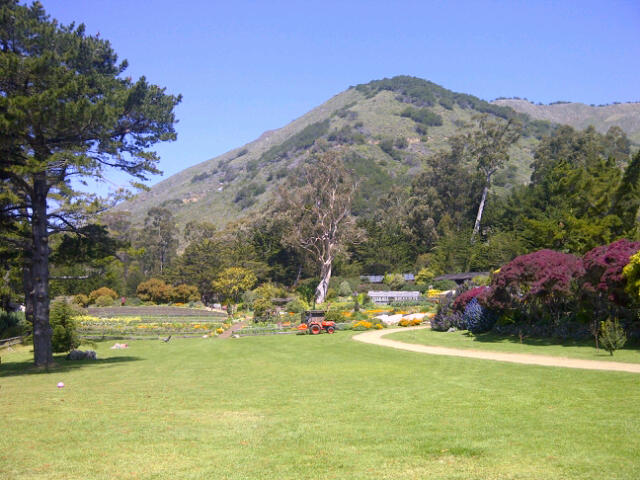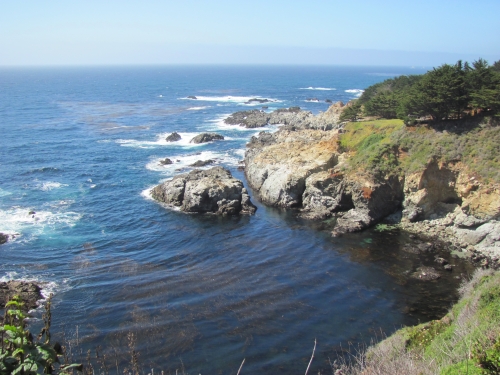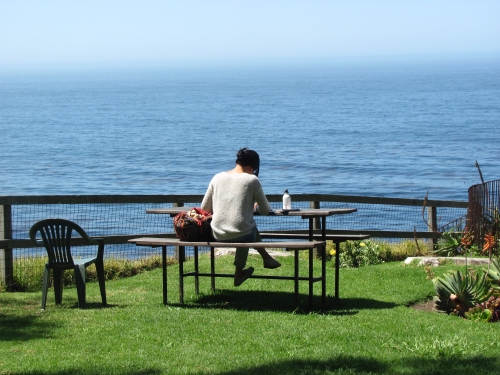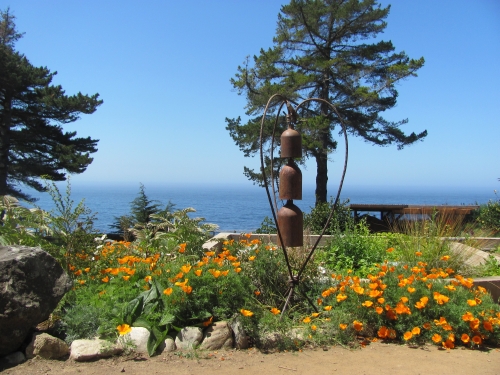It hit me as soon as we made the sharp turn off the gloriously serpentine Highway 1 at the signpost that read “Esalen Institute”. Like a cold, sharp gust of wind signifying the first day of winter, it caught me off-guard before knocking me off-balance. And then it took my breath hostage, refusing to let it go for the next 48 hours.
“It” being a mix of awe, wonderment and pure, unabashed gratitude, the kind that catches you unawares. The kind that causes you to stop dead in your tracks, needing a moment to regain your bearings. The kind that touches you somewhere deep and reminds you why you do the things you do. “It is for these moments,” it whispers gently in your ear. These. Exact. Moments.
With the backdrop of many of Hollywood’s finest productions—majestic craggy cliffs descending precipitously into the bluest of blue waters below—the Esalen Institute is the ultimate beneficiary of that thing called “place.” But instead of relying on its geographic laurels, for more than 50 years Esalen has breathed new meaning into the words “personal and social transformation.”
Established in 1962 by Michael Murphy and Dick Price, the Esalen Institute, perched so perfectly along the coast of Big Sur – and with the tagline “pioneering deep change in self and society” – has a storied history. Dedicated to its mission of exploring and realizing human potential through experience, education, and research, Esalen carved a reputation over the years as a safe and inspired haven for society’s avant-garde to share, discover and learn.
And, with past lecturers that include Aldous Huxley, Robert Bly, Erik Erikson and a guest list that boasted George Harrison, Bob Dylan and Joan Baez, it’s no surprise that Esalen is said to have set in motion the “birth of the human potential movement.”
Which is all fine and good but all you need is an hour here to understand why Travel & Leisure Magazine recently named the spot one of the Top 10 Places Worldwide to Have a Midlife Crisis. But I digress.
The Institute hosts 20,000 visitors a year who come for a weekend, a week, a month or even longer to learn, to explore and push their limits. Oh and to take in the waters. An integral and intimate part of the Esalen experience, the hot springs can be a perfect place for reflection, rejuvenation and continued conversation. And, yes, clothing-optional is seemingly integral to the Esalen ritual too. Conducting interviews with naked subjects is all part of the experience, apparently.
Yup, no matter how you slice it, Esalen is a uniquely powerful spot. If you’re here for a workshop (I came to attend one given by consultant Flip Brown on creating optimal workplace culture – you can read my story here), Esalen’s catalog of educational opportunities is diverse—from professional growth, rhythm and dance and gender studies to creative expression and contemplative spiritual studies. And though the majority lean toward the “different” or “out there,” there are certainly a growing number of courses to attract an increasing number of devotees.
But the Institute is more than its public workshops, though few may know it. Since it was founded, Esalen’s Center for Theory and Research (CTR) has been responsible for initiating new areas of research, theory and practice, with the aim of promoting social change. From programs in citizen diplomacy to pioneering research in holistic health and conferences in psychology and religion, CTR pursues areas that universities and think tanks may not want to touch, either because they’re too controversial, too new, or don’t fit neatly into any discipline. Not surprisingly, Esalen is happy to step in.
During the Cold War of the 80s, for example, Michael and Dulce Murphy launched a host of Soviet-American citizen diplomacy gatherings at Esalen. The psychologist Abraham Maslow used his own experiences at Esalen in the 1960s to found the fields of humanistic and transpersonal psychology, while Fritz Perls, the co-founder of Gestalt Therapy, used Esalen as a public platform for his method.
More recently, in response to the rise of fundamentalism and terrorism, in 2004 Esalen initiated partnerships and projects to foster healing among prominent faith leaders in Islamic, Jewish, and Christian communities. And in 2011 and 2012, CTR hosted a conference titled, “Conscious Business,” bringing together business leaders with systems thinkers and spiritual teachers to discuss the emergence of new business models respectful of employees and the environment. And that’s just the tip of the iceberg.
Having recently celebrated its 50th anniversary, I wonder if CTR’s unique commitment to social transformation will become the way forward for a landmark that must maintain relevancy in an era where “retreats” are the new black. With its pulse firmly set on the progressive-minded thinkers of our time, the courage to tackle contentious issues, and the “power of place” taking its rightful seat around the proverbial table, Esalen may just have the magic formula needed for serious social change.
All I know for sure is that a soul-captivating landscape that challenges your equilibrium and brings you metaphorically to your knees is a good starting point.
Elisa Birnbaum is the co-founder of SEE Change Magazine, and works as a freelance journalist, producer and communications consultant. She is also the president of Elle Communications.





